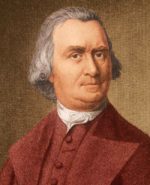The love of liberty
Is interwoven to the soul
We call for dignity
And stand up for it to be so
What is to be done
to renovate this day?
we know can fall away!
Let us reach the youth
And impress upon each mind
to live in light and truth
to be caring, good, and kind
https://democraticthinker.wordpress.com/2010/04/10/samuel-john-adams-on-government%E2%80%94letter-ii/
1. impressing the minds of men with the importance of educating their little boys and girls;
To John Adams.
—————
BOSTON, October 4, 1790.
DEAR SIR,—
Samuel Adams.
WITH pleasure I received your letter of September 12th. And as our good friend, to whom I dictated our last, is yet in town, I have requested of him a second favor.
You ask,—what the world is about to become? and,—is the millennium commencing? I have not studied the prophecies, and cannot even conjecture. The golden age, so finely pictured by poets, I believe has never as yet existed but in their own imaginations. In the earliest periods, when, for the honor of human nature, one should have thought that man had not learnt to be cruel, what scenes of horror have been exhibited in families of some of the best instructors in piety and morals! Even the heart of our first father was grievously wounded at the sight of the murder of one of his sons, perpetrated by the hand of the other. Has mankind since seen the happy age? No, my friend. The same tragedies have been acted on the theatre of the world, the same arts of tormenting have been studied and practised to this day; and even religion and reason united have never succeeded to establish the permanent foundations of political freedom and happiness in the most enlightened countries on the earth.
After a compliment to Boston town meetings and our Harvard College, as having “set the universe in motion,” you tell me,—every thing will be pulled down. I think with you, “So much seems certain.” But what, say you, will be built up? Hay, wood, and stubble, may probably be the materials, till men shall be yet more enlightened and more friendly to each other. “Are there any principles of political architecture?” Undoubtedly. “What are they?” Philosophers, ancient and modern, have laid down different plans, and all have thought themselves masters of the true principles. Their disciples have followed them, probably with a blind prejudice, which is always an enemy to truth, and have thereby added fresh fuel to the fire of contention, and increased the political disorder.
Kings have been deposed by aspiring nobles, whose pride could not brook restraint. These have waged everlasting war against the common rights of men. The love of liberty is interwoven in the soul of man, and can never be totally extinguished; and there are certain periods when human patience can no longer endure indignity and oppression. The spark of liberty then kindles into a flame, when the injured people, attentive to the feelings of their just rights, magnanimously contend for their complete restoration. But such contests have too often ended in nothing more than “a change of impostors and impositions.” The patriots of Rome put an end to the life of Caesar, and Rome submitted to a race of tyrants in his stead. Were the people of England free, after they had obliged King John to concede to them their ancient rights and liberties, and promise to govern them according to the old law of the land? Were they free after they had wantonly deposed their Henrys, Edwards, and Richards, to gratify family pride? Or, after they had brought their first Charles to the block and banished his family? They were not. The nation was then governed by king, lords, and commons; and its liberties were lost by a strife among three powers, soberly intended to check each other and keep the scales even.
But while we daily see the violence of the human passions controlling the laws of reason and religion, and stiffing the very feelings of humanity, can we wonder that in such tumults, little or no regard is had to political checks and balances? And such tumults have always happened within as well as without doors. The best formed constitutions that have yet been contrived by the wit of man, have, and will come to an end,—because “the kingdoms of the earth have not been governed by reason.” The pride of kings, of nobles, and leaders of the people, who have all governed in their turns, have disadjusted the delicate frame, and thrown all into confusion.
What then is to be done? Let divines and philosophers, statesmen and patriots, unite their endeavors to renovate the age, by
2. of inculcating in the minds of youth the fear and love of the Deity
3. and universal philanthropy, (Philanthropy (from Greek φιλανθρωπία) etymologically means "love of humanity" in the sense of caring, nourishing, developing and enhancing "what it is to be human" on both the benefactors' (by identifying and exercising their values in giving and volunteering) and beneficiaries' (by benefiting) parts.
4. and, in subordination to these great principles, the love of their country;
5. of instructing them in the art of self-government (self-gov·ern·ment
noun
- 1.government of a country by its own people, especially after having been a colony.
synonyms: independence, self-rule, home rule, self-determination, sovereignty,autonomy, nonalignment, freedom
"the self-government of our island nation" - 2.another term for self-control
I thank you for your countenance to our friend Lyde. Mrs. Adams tells me to remember her to yourself, lady, and connections; and be assured, that I am, sincerely, your friend,
SAMUEL ADAMS.
THE VICE-PRESIDENT OF THE UNITED STATES.


No comments:
Post a Comment